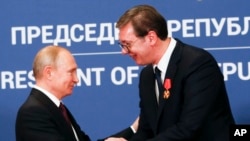Inspecting 10 newly arrived Russian armored vehicles at a Serbian Army base in Nis, Serbian President Aleksandar Vucic thanked Russian President Vladimir Putin for "strengthening" Belgrade's military.
Flown to Serbia via Hungarian airspace aboard Russian transport planes, the small fleet of BRDM-2 reconnaissance vehicles were just one part of a much larger delivery.
The remaining portion of that delivery, some 20 additional reconnaissance vehicles and dozens of refurbished Soviet-era T-72 tanks, was held up at the Romanian border. According to a statement by Romania's Foreign Ministry, Romanian customs officials refused to allow their transit via the Danube River because of European Union sanctions imposed on Russia for its actions in Ukraine.
Romania blocks
Although Serbia expressed frustration about the blocked portion of the shipment, Romania, a member of both the EU and NATO, was simply enforcing EU-mandated trade restrictions.
Hungary, also a member of both the EU and NATO, defended its decision to allow the transit of Russian equipment through its airspace despite sanctions.
Addressing reporters in Budapest on Wednesday, Hungarian Prime Minister Viktor Orbán's chief of staff, Gergely Gulyás, said the shipment was approved because the cargo passed through Hungarian airspace in a civilian, not military, plane.
"Of course we get notified about a civilian aircraft entering Hungarian airspace, but that's a completely protocol-type of notification, which should just be acknowledged," Gulyás said, explaining that non-military airspace transit doesn't require special permission.
Asked whether Hungary would be held to account for the violation, an EU spokesperson said: "We have seen reports. Without commenting on specifics, the implementation of EU restrictive measures is the responsibility of EU member states."
NATO officials, too, were reticent about Russia's latest efforts to help Serbia beef up its military.
"NATO fully respects the sovereign right of all countries, including Serbia, to choose their own political and security arrangements," a NATO spokesperson told VOA. "At the same time, NATO and Serbia are partners. For instance, Serbia hosted our biggest civil emergency exercise, helping NATO Allies, as well as Serbia and other partners, to become better prepared to deal with natural disasters, such as flooding and forest fires."
Adding that NATO has been working with Serbia to reform security forces and institutions, "NATO training also helps Serbian soldiers contribute to international peacekeeping missions."
"We have invested millions of euros to help Serbia to destroy over 200 tons of ammunition," the spokesperson said.
Military neutrality
Serbia, which claims military neutrality, has already received six MiG-29 fighter jets from Russia and is negotiating additional arms purchases from Russia, including attack and transport helicopters and air defense systems.
Some experts say a Russian-backed military build-up threatens peace in the politically fragile region.
"I applaud Romania for enforcing the EU trade embargo on Russia," Jorge Benitez, a NATO expert with the Atlantic Council, told VOA.
"This is an important and much needed sign of European unity and backbone against Russia’s efforts to further militarize and destabilize the Balkans," he said. "Other EU states should follow Romania’s example and fulfill their commitments to the European democracies. Permitting Russia to move more tanks to southeast Europe is dangerous and threatens the national security of all democracies in the region."
Serbia formally wants to join the EU, but under political and propaganda pressure from Moscow, Belgrade has steadily slid toward the Kremlin and its goal of keeping the countries in the Balkans out of NATO.
In the 1990s during the bloody breakup of the former Yugoslavia, Serbia was at war with neighbors Croatia, Bosnia and Kosovo.
Speaking at Monday's armored vehicle unveiling ceremony at the Serbian Army base in Nis — located some 88 kilometers east of the Kosovo border — Russia's Ambassador Alexander Botsan-Kharchenko said that Moscow "is ready and will always be ready for military and technical cooperation with Serbia."
For President Vucic, all that appeared to matter was the hardware on the ground.
"The most important thing for us is that we managed to transport the vehicles to Serbia," Vucic told journalists. "How and which way they came, that is our business."
U.S. State Department officials had not yet responded to requests for reaction upon publication.
This story originated in VOA's Serbian Service. Some information is from AP.
